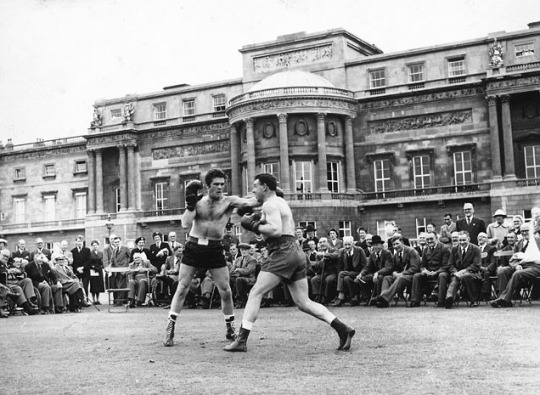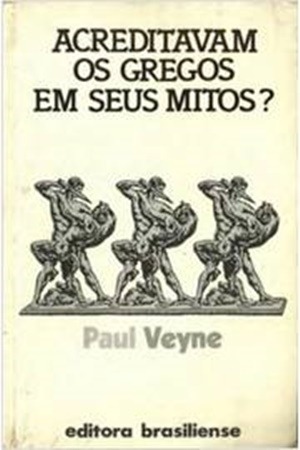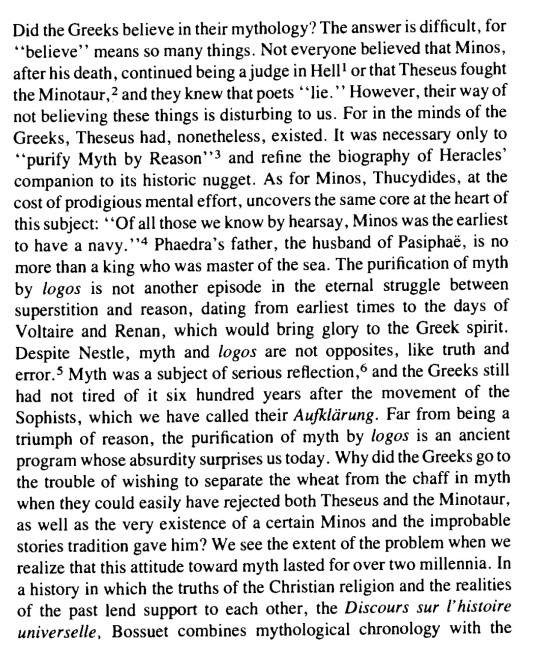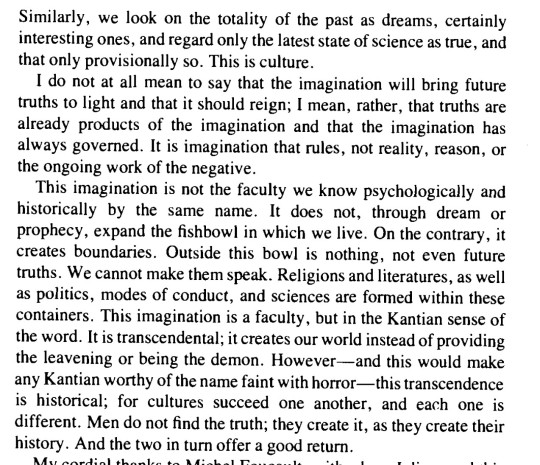#paul veyne
Text

"Le stoïcien est comparable à un conducteur qui ne doit pas quitter la route des yeux un seul instant, parce qu’à tout moment peut apparaître un panneau de signalisation ou qu’un incident peut surgir qui menacera sa sécurité ; le conducteur ne doit laisser son attention se relâcher à aucune minute, il doit faire attention sans cesse. Le grand mot est prononcé, celui d’attention, de mise sous tension ou tonus. La première lettre à Lucilius a pour but de mettre tout de suite le disciple en un état d’attention qui ne laissera aucune minute lui échapper distraitement. Le temps n’est pas un fluide gratuit, semble-t-elle dire ; le laisser fuir goutte à goutte par irréflexion, c’est saper le principe d’un emploi du temps planifié. Il faut avoir "l’âme toujours prête et tendue comme celle des athlètes pendant les combats de boxe". Le principe de planification étant posé, la seconde lettre à Lucilius commence à dresser l’emploi du temps : il faudra chaque jour s’habituer à l’idée que la pauvreté et la mort ne sont rien, en s’imprégnant des lectures que l’on fera en ce sens. Une minute de perdue est plus qu’une perte de temps, c’est un début de déshabituation à l’attention. Si l’on décide d’aller faire un tour de promenade, on fera là un acte pleinement vertueux, dès lors que la décision aura été prise avec "prudence", avec discernement. Ne pas perdre son temps veut dire l’employer à n’être plus le jouet des incidents et se tenir ainsi au-dessus du temps. On peut soupçonner sans trop de malice qu’un stoïcien faisait sans cesse trois choses à la fois : il mangeait, par exemple, il se contrôlait en mangeant, il s’en faisait une petite épopée."
Paul Veyne, Sénèque. Une introduction, 2007.
20 notes
·
View notes
Text

"Se pourrait-il que les Grecs, ces sages ancêtres qui nous ont transmis la raison, aient cru aux titans, aux cyclopes et aux héros dont ils ont peuplé leur mythologie ? Et, à supposer qu’ils aient tenu le Minotaure pour un mensonge de poète, doutaient-ils conséquemment de l’existence de Thésée ? À travers ces questions, Paul Veyne entreprend une enquête passionnante sur le statut de la vérité, l’expérience « la plus historique de toutes ». En étudiant la nature des mythes, leurs modalités de réception, leurs critères de vraisemblance et le scepticisme ambigu qu’ils suscitaient, il interroge les liens que ces récits entretiennent avec l’histoire, cet autre discours revendiquant un savoir sur le passé. Il s’agit donc moins dans ce livre d’interroger la crédulité des Grecs anciens que nos propres croyances."

Veyne's book about the Greeks and their myths is for sure a classic, but I will reproduce here a rather severe review of it by Dana L. Burgess. I find Burger's criticism largely valid, but I don't think that it "cancels" the thought provoking character of Veyne's essay (Burgess, Dana L. Review of Did the Greeks Believe in Their Myths? An Essay on the Constitutive Imagination. Philosophy and Literature, vol. 13 no. 1, 1989, p. 184-185. Project MUSE, available on https://muse.jhu.edu/article/418899):
"Did the Greeks Believe in Their Myths? An Essay on the Constitutive Imagination (review)
Dana L. Burgess
Philosophy and Literature
Johns Hopkins University Press
Volume 13, Number 1, April 1989
pp. 184-185
"Did the· Greeks Believe in Their Myths? An Essay on the· Constitutive Imagination, by Paul Veyne; translated by Paula Wissing; xii& 161 pp. Chicago: University of Chicago Press...On the final page of his essay Veyne responds to his title's question, '"But of course they believed in their myths!' We have simply wanted also to make it clear that what is true of 'them' is also true of ourselves . . ." (p. 129). According to Veyne the Greeks, like us, were able both to believe and to disbelieve aspects of their myths. "They believe in them, but they use them and cease believing at the point where their interest in believing ends" (p. 84). Veyne begins his book with some hard-headed analyses of ancient historiography . He dwells mostly on Pausanias, but uses various historians' statements on credulity to establish the idea that ancient historians are little concerned with the accuracy of their sources. Veyne asserts that the historian's phrase "it is said" may automatically mean "it is true," given a certain understanding of truth. On the other hand, both Pausanias and Herodotus make curious statements which suggest their incredulity of the very stories they relate. Veyne understands from the tension between credulity and incredulity that the nature of ancient belief was complex and dynamic. From this notion of Greek credulity Veyne develops his own ideas about the nature of truth. He is thus able, by the end of the essay, to affirm that our own varieties of belief resemble those of the Greeks precisely because truth is, and always was, "plural and analogical" (p. 87).
But are the statements of these ancient historians valid grounds for an understanding of the nature of ancient mythological belief? In the jump from historiography to theory of myth, Veyne has depended more upon his own notions of the plural nature of truth than he has on ancient evidence for the nature of mythological belief. This book is not about Pausanias, or anything else in antiquity. The author really wants to talk about the "plural and analogical" (p. 87) nature of truth; so these discussions of ancient thought finally seem nothing more than a peg for his own assertions. He has used his own understanding of the nature of truth to argue for an ancient similarity between historical and mythological credulity.
"An ancient historian does not cite his authorities, for he feels that he is a potential authority himself" (p. 9). So too does Veyne feel that his own notions of truth are more important than the precise analysis of ancient historiography and mythography (And, like the ancient historians whom he discusses, Veyne does not feel compelled to cite his authorities with any rigor. There are at least twenty-four instances in which Veyne fails to give an adequate reference for a quotation or discussion of another author's work.) By the time we have reached the final chapter we have wholly lost Pausanias and ancient thought. The argument and its language have become quite vague: "Our hypothesis can be stated in this way as well: At each moment, nothing exists or acts outside these palaces of the imagination. . . . These palaces are not built in space, then. They are the only space available" (p. 121). This reader was much more interested in Veyne's analysis of ancient historiography than in his philosophical speculations . Finally, it is not clear that Veyne's musings on the mutability of truth are particularly illuminated by his discussion of Pausanias's doubt. Certainly Pausanias had notions of truth which merit a detailed examination. Ancient authors are done a disservice when a precise examination of their thought is replaced by a critic's own assertions about the nature of truth.
Whitman College
Dana L. Burgess"
4 notes
·
View notes
Link
Paul Veyne magistral historiador francés del mundo antiguo, ha fallecido a los 92 años.
7 notes
·
View notes
Quote
Les fins extra-économiques sont aussi honorées de nos jours qu’au temps d’Aristote et même beaucoup plus, puisqu’il y a beaucoup plus d’argent et qu’il faut bien que cet argent aille quelque part.
Paul Veyne, Le Pain et le Cirque. Sociologie historique d'un pluralisme politique
2 notes
·
View notes
Text
Le créateur est enfermé en une chambrette de monomanie dont le papier de tapisserie répète indéfiniment sur les murs le motif allegorique du Chasseur; et que chasse-t-il donc à travers ses larmes? Quelque poème, quelque chemise qui le réchauffe sur “la plus inoccupée des routes”.
Paul Veyne, René Char en ses poèmes, 1990.
5 notes
·
View notes
Text
#1.595 – Paul Veyne – Acreditavam Os gregos em Seus Mitos? (1983).
A mitologia grega é de enorme influência na sociedade ocidental. Esta é uma inquestionável verdade. Os mitos gregos fundamentam desde o senso comum, como por exemplo na imagem do “presente de grego” quanto no aspecto cultural, como no caso dos complexos de Electra, Édipo, etc. que demonstram facetas da personalidade humana que, muitas vezes, nos surpreendem pelo inusitado e pelo quão real são em…

View On WordPress
0 notes
Note
Do you think Alexander and Hephaistion are similar to Achilles and Patroclus? I know that the comparison was later exaggerated and that we can't be sure of the Hephaistion-Patroclus comparison, but Alexander sometimes compared himself to Achilles so perhaps he once compared Hephaistion to Patroclus. My point is that I think that if the comparison was exaggerated it was for the reason that they look alike, I have even seen several people say that they are similar to each other or that Alexander and Hephaistion reminded them of Achilles and Patroclus, so I wanted to know your opinion on whether you think they look alike or not.
I'm not asking about the historical basis of this comparison, I'm asking about whether Alexander and Hephaistion are similar to Achilles and Patroclus, thank you so much :)
Are Alexander and Hephaistion similar to Achilles and Patroklos?
NO.
And for one very important reason. Achilles and Patroklos are fictional characters, Alexander and Hephaistion were real people.
As for whether they looked alike...we have no idea. Period. Full stop.
Yes, I know that will probably annoy, and possibly even alienate the asker, but it’s uber-important.
Achilles and (even more) Patroklos are 2-dimensional in Homer because he needed them as symbols. Patroklos has ONE primary purpose: to die. Plus a secondary purpose as the voice of compassion in contrast to hard-hearted Achilles.
Stop thinking of Madeline Miller, The Song of Achilles, and “Patrochilles.”
Reducing Alexander and Hephaistion to Achilles and Patroklos not only oversimplifies Alexander but completely erases Hephaistion and his very real capabilities as a commander and diplomat. He becomes just “the boyfriend.” I HATE THAT.
Other than the apparent devotion between Alexander and Hephaistion, comparisons end there. Remember, Patroklos had ONE job in the Iliad…to die. And to do so 1) forgetting he’s not Achilles (hubris), but 2) heroically, earning him glory (kleos). His death sets up Achilles’s descent into inhumanity, dragging the body of his worthy opponent Hektor behind his chariot. That is low, folks. Really, really low. He’s redeemed at the end as he and Priam share grief (a human emotion from the Greek point-of-view).
Hephaistion was not a character with a plot purpose. He was a real human being.
And he did not die in battle presenting himself as Alexander. He died of an infectious disease, possibly typhoid, and possibly aggravated by not following his physician-prescribed diet.
When Alexander visited Troy at the outset of his campaign, he made a lot of symbolic gestures that recalled Homer. Only one was to sacrifice at the tomb of Achilles, while maybe Hephaistion sacrificed at Patroklos’s. Both of which were not real graves because Achilles and Patroklos were not real people. Yet in the ancient world, even if/when the ancients questioned the gods as described in myth, they rarely/never questioned the heroes. For more on this, check out Paul Veyne’s Did the Greeks Believe in Their Myths?
But again, Alexander made numerous symbolic gestures when he landed at Troy. He was trying to frame his campaign in an epic tradition dating back to Homer. If he’s the New Achilles, he needed a New Patroklos. It was marketing.
We get NO other such comparison in our sources until Hephaistion died. Then Alexander aped Achilles’s mourning much like modern bereaved use the Bible or poetry to express the deep pain they’re feeling. Certainly, during their lives, they were NOT thinking that Hephaistion would predecease Alexander! It’s only after he did that these comparisons were made…and it’s more general than specific. Again, Hephaistion didn’t die in combat or while pretending to be Alexander.
So while I know the asker wanted me to compare them in themselves, that’s literally impossible. Like comparing apples to oranges. Fictional people to real people.
Alexander and Hephaistion were not big Patrochilles’ fans. I’m sorry to burst that romantic bubble, but I prefer to think of Hephaistion as more than just Alexander’s boyfriend and destined to die. He was one of Alexander’s leading commanders, and chiliarch at his death.
Let’s let him be that, okay?
(Sorry that all this probably reads snarky, but it’s something I feel rather strongly about. I hate seeing Hephaistion reduced to Alexander’s sidekick and romantic love-interest. He was much, much more.)
#asks#Patrochilles#Alexander the Great#Hephaistion#Hephaestion#Madeline Miller#The Song of Achilles#alexander x hephaestion#alexander x hephaistion#Classics#Homer#Achilles#Patroklos#Patroclus
33 notes
·
View notes
Text
che cos'era una chiesa cristiana?
si usavano già allora queste parole? Probabilmente si. Nelle lettere Paolo parla delle sue "chiese" - che per essere meno clericali potremmo chiamare semplicemente "gruppi". E "cristiana"? Anche. La parola è nata ad Antiochia, in Siria, dove Paolo ha cominciato la sua predicazione una decina d'anni dopo la morte di Gesù. Sotto la guida di Paolo si sono moltiplicate le conversioni e si sono cominciati a chiamare christianoí i seguaci di quel Christós che parecchi, a partire dalle autorità romane, consideravano un capo ribelle ancora in vita. Questa leggenda metropolitana ha cominciato a diffondersi e nel 41 è arrivata a Roma dove per tutta risposta l'imperatore Claudio ha emanato un decreto contro gli ebrei, accusati di provocare disordini in nome del loro leader Christós.
Roma, Antiochia e Alessandria erano le capitali del mondo, ma anche in una zona periferica dell'Impero come la Macedonia, dove viveva Luca, poche decine di persone in qualche città si consideravano la Chiesa di Cristo. Queste poche decine di persone non erano poveri pescatori incolti come nella Galilea delle origini, di cui non sapevano nulla, e nemmeno uomini di potere, ma piuttosto bottegai, artigiani, schiavi. Luca mette l'accento su alcune reclute di classe più elevata, soprattutto romane, ma Luca è un po' snob, portato al name-dropping, il tipo capace di precisare che Gesù non era soltanto figlio di Dio ma discendeva anche, da parte di madre, da un'ottima famiglia.
Alcuni erano ebrei ellenizzati, la maggior parte greci giudaizzanti, ma dopo il loro incontro con Paolo tutti, ebrei e greci, pensavano di aver aderito a una delle correnti più pure e autentiche della religione d'Israele, non a una fazione di dissidenti. Continuavano ad andare in Sinagoga, se non venivano accolti con eccessiva ostilità. L'ostilità si manifestava, ovviamente, laddove c'erano una vera sinagoga, una vera colonia ebraica e veri ebrei circoncisi. Non era il caso di Filippi, mentre era il caso di Tessalonica, dove Paolo è andato subito dopo. Quando il nuovo arrivato ha attratto a sé una parte dei loro fedeli, gli ebrei non l'hanno presa bene. Lo hanno denunciato alle autorità romane come fomentatore di disordini e lo hanno costretto a fuggire; la scena si è ripetuta a Berea, la città vicina. Che cosa potevano fare allora i convertiti di Paolo? O andare come prima in sinagoga, e vedersi in privato, senza richiamare l'attenzione, per mettere in pratica le istruzioni lasciate dal nuovo guru. O aprire un'altra sinagoga.
Ma davvero? Era così semplice? Facciamo un po' di fatica a crederlo. Pensiamo subito a scismi, eresie. Il fatto è che siamo abituati a vedere in ogni religione un fenomeno più o meno totalizzante, ma nell'antichità non era affatto così. Su questo punto, come su molti altri che riguardano la civiltà greco-romana, mi rifaccio a Paul Veyne, scrittore magnifico oltre che grande storico. Ora, dice Paul Veyne, nel mondo greco-romano i luoghi di culto erano piccole imprese private; il tempio di Isis di una città non aveva più rapporti con il tempio di Isis di un'altra città di quanti non ne abbiano, per esempio, due panifici. Uno straniero poteva dedicare un tempio a una divinità del proprio paese esattamente come oggi potrebbe aprire un ristorante etnico. Era il pubblico a deciderne il futuro, andandoci o no. Se arrivava un concorrente, al massimo poteva soffiare dei clienti al tempio - rimprovero che veniva mosso spesso a Paolo.
Già gli ebrei prendevano questi argomenti meno alla leggera dei pagani, ma sono stati i cristiani a creare un'organizzazione religiosa centralizzata, con la sua gerarchia, il suo Credo valido per tutti e i provvedimenti contro chi non si allineava. Nel periodo di cui parliamo questa invenzione era ancora ai suoi primi vagiti. Quello che cerco di descrivere somiglia, più che a una guerra di religione - gli antichi non sapevano nemmeno che cosa fosse -, a un fenomeno che si osserva spesso nelle scuole di yoga e di arti marziali, e di sicuro anche in altre realtà, ma io parlo di quella che conosco. Un allievo di livello avanzato decide di passare all'insegnamento e si porta dietro una parte dei condiscepoli. Il maestro ci rimane male, e lo fa più o meno vedere. Per amor di concordia alcuni allievi alternano i corsi dell'uno e dell'altro, e dicono che si trovano bene, che i due corsi si integrano. Dopo un po', la maggior parte fa una scelta.
-Emmanuel Carrère -Il Regno
17 notes
·
View notes
Text

"A chaque instant, l’existence nous propose des devoirs et nous assaille de sollicitations ou de tentations ; irai-je me distraire au théâtre cet après-midi ? Dois-je sortir en ville pour remplir un devoir de politesse mondaine ? Je ne peux laisser cela au hasard, puisque j’ai une tâche suprême, que je dois soumettre mes devoirs vrais ou prétendus au jugement de la seule raison, que la moindre tentation menace ma sécurité intérieure et que la moindre action m’habitue un peu plus au bien et au mal. Vivre au jour le jour, c’est s’habituer chaque jour un peu plus au mode de vie non rationalisé qui est celui des "fous" que nous sommes tous. La nouvelle existence, celle du stoïcien, est faite d’un contrôle incessant ; comme dit Sénèque, "une infinité d’incidents surviennent à chaque heure et exigent que l’on avise, et c’est à la philosophie qu’il fait demander conseil". La condition du bonheur est que la forteresse intérieure décrète en permanence l’état de siège."
Paul Veyne, Sénèque. Une introduction, 2007.
8 notes
·
View notes
Photo

back to busan
« Mais l’origine du capitalisme (et aussi bien du socialisme) est la tendance humaine à déployer les capacités rationnelles, dès qu’il se découvre qu’un quelconque domaine d’action est assez compliqué pour permettre ce déploiement. »
( Paul Veyne, Le Pain et le Cirque. Sociologie historique d'un pluralisme politique )
70 notes
·
View notes
Link
Podcast en fracés con una conversación entre Jacques Le Goff y Paul Veyne sobre “Como escribimos la historia”.
0 notes
Quote
Toute activité rationnelle procure un plaisir.
Paul Veyne, Le Pain et le Cirque. Sociologie historique d'un pluralisme politique via
0 notes
Text
3 notes
·
View notes


